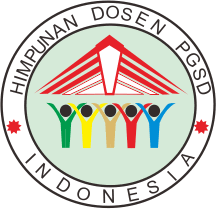Dampak pembelajaran daring dan luring terhadap pengetahuan peserta didik pada materi sifat perkalian kelas vi
Abstract
Keywords
Full Text:
PDFReferences
D. I. Hidayatullah, Riyadi, dan I. ragil W. Atmojo, “Implementasi model pembelajaran individualization ( TAI ) untuk meningkatkan keterampilan pemecahan masalah perkalian bilangan cacah peserta didik kelas V sekolah dasar,” Didakt. Dwija Indria, no. 1985, hal. 8–13, 2020. [2] N. Rahmah dan D. Asnidar, “Hubungan Penguasaan Perkalian Dan Pembagian Dasar Terhadap Prestasi Belajar Matematika Siswa Kelas VIII SMP PMDS Putra Palopo,” 2015. [3] I. B. Fauziah, Sukarno, dan M. I. Sriyanto, “Identifikasi Kesulitan Belajar Matematika di Rumah Selama Pandemi Covid-19 pada Siswa Kelas IV Sekolah Dasar,” J. Pendidik. Dasar, vol. 9, no. 1, hal. 25–30, 2021, doi: https://doi.org/10.20961/jpd.v9i1.[4] N. Laila, Riyadi, dan M. I. Sriyanto, “Analisis kesulitan belajar peserta didik kelas IV sekolah dasar pada materi FPB & KPK di masa pandemi Covid-19 berdasarkan kecerdasan logis matematis,” JPI (Jurnal Pendidik. Indones. J. Ilm. Pendidik., vol. 8, no. 1, hal. 1–6, 2022. [5] Hartatiana, “Pengembangan Soal Pemecahan Masalah Berbasis Argumen Untuk Siswa Kelas V Di SD Negeri 79 Palembang”. [6] L. J. Moleong, Metode Penelitian Kualitatif. Bandung: PT. Remaja Rosdakarya, 2015. [7] Sugiyono, Metode Penelitian Kuantitatif, Kualitatif, dan R&D. Bandung: CV. Alfabeta, 2016. [8] D. Jamaluddin et al., “Pembelajaran Daring Masa Pandemik Covid-19 Pada Calon Guru: Hambatan, Solusi Dan Proyeksi,” Bandung, 2020. [9] H. Aditia Rigianti, “Kendala Pembelajaran Daring Guru Sekolah Dasar Di Kabupaten Banjarnegara,” 2020. [10] R. Andrianto Pangondian, P. Insap Santosa, dan E. Nugroho, Seminar Nasional Teknologi Komputer & Sains (SAINTEKS) Faktor-Faktor Yang Mempengaruhi Kesuksesan Pembelajaran Daring Dalam Revolusi Industri 4.0. Yogyakarta, 2019. [Daring]. Tersedia pada: https://seminar-id.com/semnas-sainteks2019.html [11] A. Asmuni, “Problematika Pembelajaran Daring di Masa Pandemi Covid-19 dan Solusi Pemecahannya,” J. Paedagogy, vol. 7, no. 4, hal. 281, Okt 2020, doi: 10.33394/jp.v7i4.2941. [12] A. Wardani dan Y. Ayriza, “Analisis Kendala Orang Tua dalam Mendampingi Anak Belajar di Rumah Pada Masa Pandemi Covid-19,” J. Obs. J. Pendidik. Anak Usia Dini, vol. 5, no. 1, hal. 772, 2020, doi: 10.31004/obsesi.v5i1.705. [13] A. S. Syarifudin, “IMPELEMENTASI PEMBELAJARAN DARING UNTUK MENINGKATKAN MUTU PENDIDIKAN SEBAGAI DAMPAK DITERAPKANNYA SOCIAL DISTANCING,” J. Pendidik. Bhs. dan Sastra Indones., vol. 5, no. 1, hal. 31–34, 2020. [14] N. Wadhwa, S. Khatak, dan Poonam, “Online Versus Offline Mode of Education-Is India Ready to Meet the Challenges of Online Education in Lockdown?,” Psychosoc. Asp. Narcolepsy, vol. 48, no. July, hal. 191–196, 2020. [15] N. S. Tanuwijaya dan W. Tambunan, “Alternatif Solusi Model Pembelajaran Untuk Mengatasi Resiko Penurunan Capaian Belajar Dalam Pembelajaran Tatap Muka Terbatas Di Masa Pandemic Covid 19,” J. Manaj. Pendidik., vol. 10, no. 2, hal. 80–90, 2021, doi: 10.33541/jmp.v10i2.3272.
Refbacks
- There are currently no refbacks.



